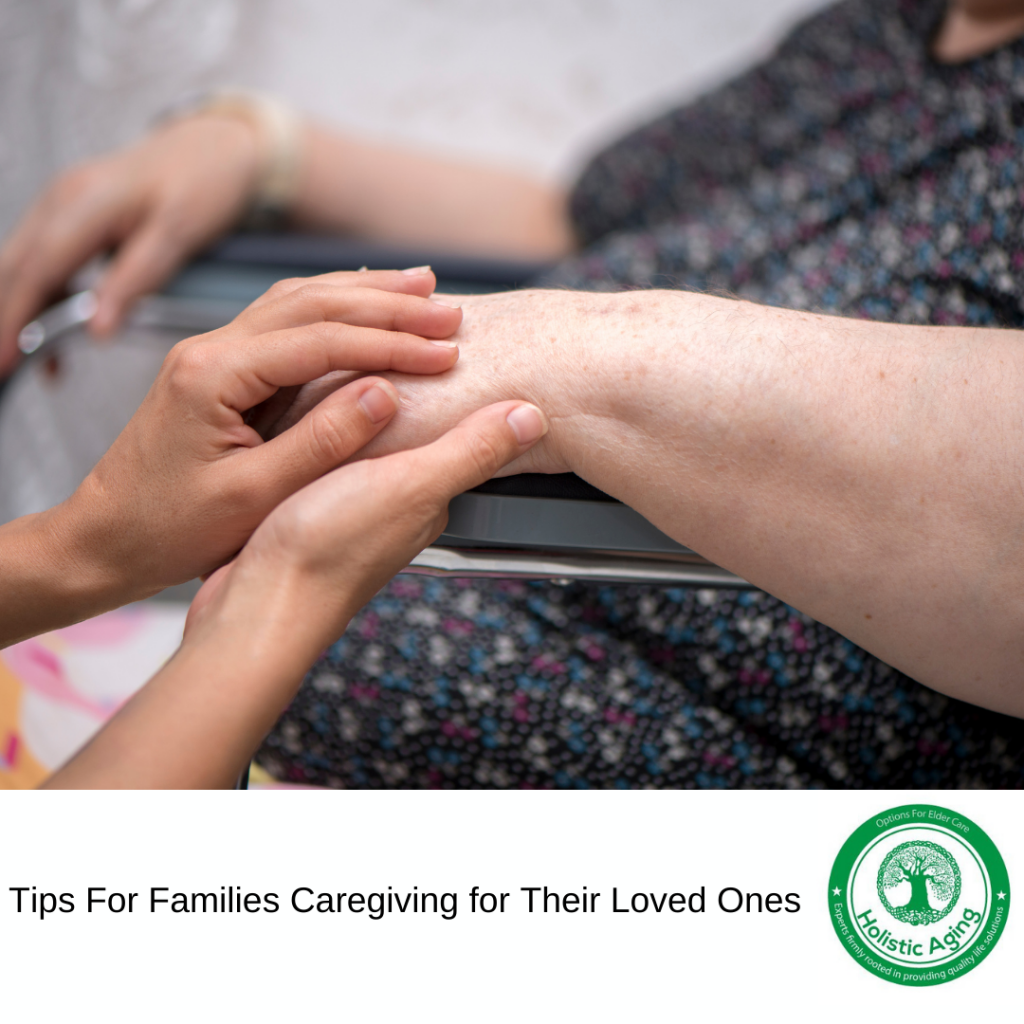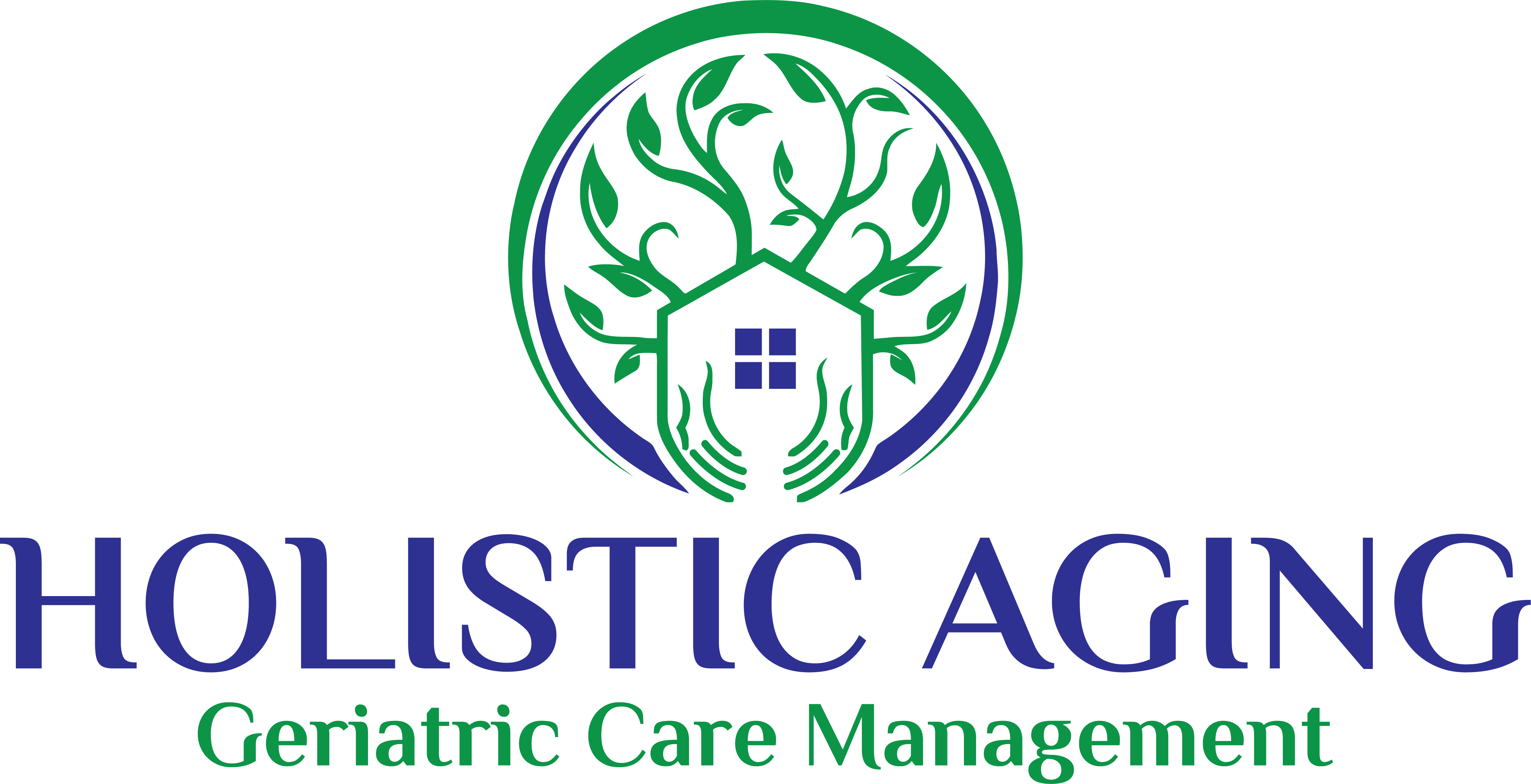
Tips For Families Caregiving for Loved Ones
Caregiving for loved ones (mom or dad), whether you live an hour away or in a different state presents very real challenges. How can you be both a daughter/son and coordinate necessary tasks when you have the responsibility to manage your parent’s care from far away? The number of American’s providing or managing care for a relative or friend over 50+ years is about 46.5 million and growing every day.
Even Aging Life Care Managers, like myself, that are experts in the field of managing aging, recognize the solution involves putting a team together and using each team member’s strength. While it can be challenging to coordinate all aspects of care from afar, Holistic Aging can provide resources specific to families attempting to manage their parents care.
Come Together as a Family in Caregiving
Invariably, the demands of caregiving bring out old patterns and unresolved family tensions. Past wounds reopen and childhood rivalries reemerge. Conflicts can arise when adult children have differing opinions on the reality of their parent’s needs or illness. Discourse surfaces when the caregiver duties are unequal among the siblings. One adult child typically bears the burden of care, while the others feel out of touch.
- Have a family meeting, possibly conducted by a third party such as an Aging Life Care Manager, where the entire picture of the caregiving needs is expressed honestly and directly
- Be realistic of your expectations of your siblings. I always tell our clients; “Everyone can contribute what they are able. Past relationships with the parents, along with current life pressures and comfort with direct caregiving roles will play into this”. Family members that cannot provide the direct care may opt to manage finances, review insurance, run errands, or be the person paying for external support such as the Aging Life Care Professional assistance or a caregiver to provide caregiving respite. Express appreciation to all family members for help they are able to provide.
- Try to forgive family members who continue to refuse to help in a loved one’s care. The one thing we have control over in a situation is our reaction. Attempt to work through your negative emotions to take care of yourself and move forward.
- Express your feelings both honestly and directly. All family members should know their help is both wanted and needed. All family members should be kept informed of the parents condition
Recognize and acknowledge the legacy of family dynamics
The demands of caregiving bring out old unresolved tension in the family structure. It is not unusual for adult children attempting to work together in help their parents, find themselves replaying their historical role in the family hierarchy. Ideally, the experience of caregiving is a time for siblings to come together and provide mutual support to one another.
- Strained sibling or other relations can contribute to the difficulties you face. It is challenging to coordinate care, especially with all the adult children living at a distance.
- This makes it hard to agree on the legal and medical decisions required on behalf of your loved one when everyone’s opinion does not have equal weight.
- It is important to resolve these conflicts immediately as ignoring them creates greater challenges and impede a family’s capacity to provide the greatest quality of care for a parent.
- Try to respect other sibling’s perceptions and find opportunities to compromise.
- Recognize and resolve childhood rivalries
Unequal Division of caregiver duties

The problem we see most often is discord surfaces from the unequal division of caregiving duties. In most instances, one sibling takes on the primary role of caring for a loved one. This may be because he or she lives closest to a parent, is perceived as having less work or fewer family obligations, or is considered the “favorite” child. Regardless of the reasons, this situation can lead the overburdened caregiver to feel frustrated and resentful and other siblings to feel uninformed and left out.
- Avoid the “caregiver martyr syndrome”. One family member may commit to care for an older loved one, and the caregiving consumes that person’s life. These caregivers believe they are the only ones who can care properly for their family member. Tunnel-vision takes over and caregiving becomes their identities.
- Family members can gently point out the areas of concern and offer to reduce the caregiver’s load by pitching in where they can
- If family members can’t provide direct care, there are other ways to help. They can offer to pay for respite care or a “Day at the Spa” for this primary caregiver.
- Senior caregiving is a noble undertaking but is not a job for one person. What happens to the patient when their overextended caregivers are hospitalized or even die prematurely? In order to prevent this common scenario, it is critical for caregivers to shake the martyr syndrome.
- Hiring a Life Care Manager can change the dynamics of this martyr syndrome also. Often a caregiver will accept the expert advice of the Aging Life Care Manager more seriously than a family member or friend.
Disagreement of what is the best option for your parent

Mom has been diagnosed with dementia and it is clear that she can no longer live alone. Two of the adult children feel that an assisted living facility is the best care option, but your brother disagrees. Every conversation you have with him seems to lead to confrontation and hurt feelings.
- Some siblings may be in denial over their parent’s condition. Adult children who seem unable to accept the reality of their parent’s illness may be protecting themselves from facing their eventual decline, death and their own loss.
- Use a systematic process for helping you determine the best option in care for your parent(s). Have your brother make a list of why he feels staying in the home is the best interest for your parent and you make a list of why you feel an assisted living is in their best interest. Share your thoughts systematically and nonjudgmentally.
- This is a surmountable decision and it would be wise to navigate this journey with the expert assistance of an Aging Life Care Manager professional who has led many families on this journey.
Providing care for an aging or ill parent can bring out the best and the worst in sibling relationships. Allow each siblings to help in ways they are able and divide tasks according to individual abilities, current life pressures and personal freedoms. If siblings are unable to help with care, seek other assistance to provide a respite for yourself.
If communication is particularly contentious, arrange a family meeting. Make sure to include an outside facilitator or Aging Life Care Professional who can ensure that everyone’s voice is heard.
On an airplane, an oxygen mask descends in front of you. What do you do? As we all know, the first rule is to put on your own oxygen mask before you assist anyone else. Only when we first help ourselves can we effectively help others. Caring for yourself is one of the most important things you can do as a caregiver, often the most frequently forgotten. Meeting your needs will benefit those you care for.
